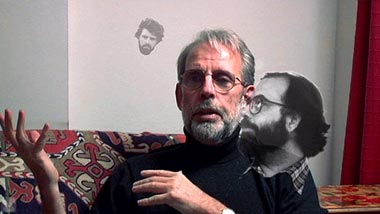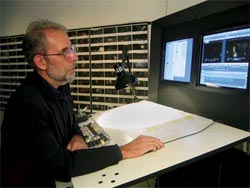The Art of Alchemy: 2007 San Francisco International Film Festival (Part 1)
The tone was set as I stood in line for my first viewing of the 50th San Francisco International Film Festival at the Museum of Modern Art: A middle-aged couple standing behind me were grumbling about the design of the interior of the museum, which was, in the words of the man, a "fucking shoebox." Later I would find out that the man was an architect, and as I filed into the theater, noticing the grizzled, onery oldsters in the crowd, I mused once again about how you can tell what the subject of a film will be, based on the audience.
I've always been ambivalent about film festivals, and the ambivalence comes through loud and clear when it comes to the SF International Film Festival. It's an indispensible event for anyone who loves film, even in this media-savvy age where movies can be downloaded at a drop of a hat -- at its best, it's like a friend tapping you on the shoulder and whispering, Hey have you heard about this film?
On the other hand, there's always a whiff of self-congratulation about festivals like these, that those faces in the crowd are people who "wouldn't be caught dead" watching a film at the local cineplex. It's the same feeling one gets when a snooty waiter at the local high-class restaurant looks you up and down when you enter: Are you worthy of this feast? Surely you recognize quality when you see it ...
In the end, movies are a personal communion -- sure we might laugh and cheer and get caught up with the audience reactions, but it's only the recollection of the event, the post-mortem over a beer at the local beer or a sudden memory of the film days or months later, that seals our opinions of it. So setting aside the accoutrements, the hype, and the black-tie element to the festival, what's left are the films.
Murch (2006, Dir. Edie & David Ichioka)
"Every film we make is a foreign language we need to learn."
-- Walter Murch

It was fitting that I kicked off my participation in this year's festival with this documentary, as it reminds us that the Bay Area was the locus for some pretty amazing films in the '70s that basically changed mainstream cinema as we know it.
The film is a simple sit-down conversation with editor Walter Murch, the man responsible for cutting and pasting Francis Ford Coppola's classics, and more recently, Anthony Minghella's films. Shot by former assistant Edie Ichioka, with cutesy little editing flourishes (jittery cuts between thoughts, ambient noise for when he's referencing certain sound effects like a helicopter or an overhead train, floating heads of directors and producers sitting on his shoulder), it's basically a master seminar on editing (and indeed, most of it seems to come from Murch's editing seminars, the material of which can also be found in his book In the Blink of an Eye). His personality is a bit on the dry side, but he's articulate and insightful about the process, which is a mix of steady calculation (among his many metaphors is the film as a body which "accepts or rejects" what you're doing to it), alchemy (layering random musical layers for the infamous "horse head" scene in The Godfather), and pure serendipity (the accidental superimposition of Hungarian folk chants and Bach's Goldberg variations for the finale of The English Patient).
 |
The film Murch is just a brief survey of his methods, but in its breadth it's very entertaining, and I recommend it for anyone who has any interest in the art of editing, and as a glimpse into cinema history. You certainly won't watch Willem Dafoe's thumbs getting cut off in The English Patient or the opening firestorm of Apocalypse Now in the same way ever again.


0 Comments:
Post a Comment
<< Home